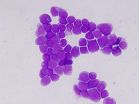(Press-News.org) HOUSTON -- (Nov. 11, 2010) – The brain works because 100 billion of its special nerve cells called neurons regulate trillions of connections that carry and process information. The behavior of each neuron is precisely determined by the proper function of many genes.
In 1999, Baylor College of Medicine (www.bcm.edu) researcher Dr. Huda Zoghbi (http://www.bcm.edu/genetics/index.cfm?pmid=11053), and her colleagues identified mutations in one of these genes called MECP2 as the culprit in a devastating neurological disorder called Rett syndrome (http://www.nichd.nih.gov/health/topics/rett_syndrome.cfm). In new research in mice published in the current issue of the journal Nature (www.nature.com), Zoghbi and her colleagues demonstrate that the loss of the protein MeCP2 in a special group of inhibitory nerve cells in the brain reproduces nearly all Rett syndrome features.
Children, mostly girls, born with Rett syndrome, appear normal at first, but stop or slow intellectual and motor development between three months and three years of age, losing speech, developing learning and gait problems. Some of their symptoms resemble those of autism.
These inhibitory (gamma-amino-butyric-acid [GABA]-ergic) neurons make up only 15 to 20 percent of the total number of neurons in the brain. Loss of MeCP2 causes a 30 to 40 percent reduction in the amount of GABA, the specific signaling chemical made by these neurons. This loss impairs how these neurons communicate with other neurons in the brain. These inhibitory neurons keep the brakes on the communication system, enabling proper transfer of information.
"In effect, the lack of MeCP2 impairs the GABAergic neurons that are key regulators governing the transfer of information in the brain", said Dr. Hsiao-Tuan Chao (http://www.bcm.edu/labs/zoghbi/Lab_members_info/chao.html), an M.D./Ph.D student in Zoghbi's laboratory and first author of the report.
Chao made the discovery by developing a powerful new tool or mouse model that allowed researchers to remove MeCP2 from only the GABAergic neurons.
"We did this study thinking that perhaps all we would see was a few symptoms of Rett syndrome," said Chao. "Strikingly, we saw that removing MeCP2 solely from GABAergic neurons reproduced almost all the features of Rett syndrome, including cognitive deficits, breathing difficulties, compulsive behavior, and repetitive stereotyped movements. The study tells us that MeCP2 is a key protein for the function of these neurons."
Once the authors determined that the key problem rested with the GABAergic neurons, they sought to find out how the lack of MeCP2 disturbed the function of these neurons. Chao discovered that losing MeCP2 caused the GABAergic neurons to release less of the neurotransmitter, GABA. This occurs because losing MeCP2 reduces the amount of the enzymes required for the production of GABA.
Intriguingly, prior studies showed that expression of these enzymes is also reduced in some patients with autism, schizophrenia and bipolar disorder, said Chao.
"This tells us a lot about what is going on in the brains of people with Rett syndrome, autism or even schizophrenia," said Chao. "A child is born healthy. She starts to grow and then begins to lose developmental milestones. Communication between neurons is impaired, in part due to reduced signals from GABAergic neurons."
"This study taught us that an alteration in the signal from GABAergic neurons is sufficient to produce features of autism and other neuropsychiatric disorders," said Zoghbi, a Howard Hughes Medical Institute investigator and director of the Jan and Dan Duncan Neurological Research Institute at Texas Children's Hospital.
INFORMATION:
Others who took part in this work include Hongmei Chen, Rodney C. Samaco, Mingshan Xue, Maria Chahrour, Jong Yoo, Jeffrey L. Neul, Hui-Chen Lu, Jeffrey L. Noebels and Christian Rosenmund, all of BCM, John L.R. Rubenstein of University of Calfornia in San Francisco, Marc Ekker of University of Ottawa in Ontario, and Shiaoching Gong and Nathaniel Heintz of The Rockefeller University in New York.
Funding for this work came from the Howard Hughes Medical Institute, the National Institute of Neurological Disorders and Stroke, the Simons Foundation, the Rett Syndrome Research Trust, the Intellectual and Developmental Disability Research Centers, the International Rett Syndrome Foundation, Autism Speaks, the National Institute of Mental Health, Baylor Research Advocates for Student Scientists and McNair Fellowships.
When the embargo lifts, this report will be available at www.nature.com.
For more information on basic science research at Baylor College of Medicine, please go to www.bcm.edu/news.
Inhibitory neurons key to understanding neuropsychiatric disorders
2010-11-11
ELSE PRESS RELEASES FROM THIS DATE:
Stem cell transplants in mice produce lifelong enhancement of muscle mass
2010-11-11
A University of Colorado at Boulder-led study shows that specific types of stem cells transplanted into the leg muscles of mice prevented the loss of muscle function and mass that normally occurs with aging, a finding with potential uses in treating humans with chronic, degenerative muscle diseases.
The experiments showed that when young host mice with limb muscle injuries were injected with muscle stem cells from young donor mice, the cells not only repaired the injury within days, they caused the treated muscle to double in mass and sustain itself through the lifetime ...
Tetris flashback reduction effect 'not common to all games'
2010-11-11
The computer game Tetris may have a special ability to reduce flashbacks after viewing traumatic images not shared by other types of computer game, Oxford University scientists have discovered in a series of experiments.
In earlier laboratory work the Oxford team showed that playing Tetris after traumatic events could reduce memory flashbacks in healthy volunteers. These are a laboratory model of the types of intrusive memories associated with post-traumatic stress disorder (PTSD).
In this new experimental study, the researchers compared the effectiveness of Tetris ...
Colorectal cancer risk increases in prostate cancer patients on androgen deprivation therapy
2010-11-11
Men taking androgen deprivation therapy (ADT) for prostate cancer may have an increased risk of colorectal cancer, according to a study published online November 10 in The Journal of the National Cancer Institute.
Androgen deprivation therapy is a widely-prescribed treatment in men with prostate cancer, although its usage for low-risk disease remains controversial, given the adverse side effects, including osteoporosis, cardiovascular disease, diabetes and obesity; the last two are risk factors for colorectal cancer.
To determine whether prostate cancer patients taking ...
Why New York City is average: Researchers want to improve how we determine urban exceptionality?
2010-11-11
Think New York is an exceptional city? It's not. The Big Apple is just about average for a city of its size. However, San Francisco is exceptional. Its inhabitants are wealthier, more productive, more innovative, and subject to fewer crimes than you would expect, given its size.
Turns out many of the cities we typically think of as great ones probably wouldn't show up near the top of most rankings, if Luis Bettencourt of the Santa Fe Institute has his way. He and his colleagues believe traditional per-capita measures are not very useful for determining what makes one ...
Don't clamp umbilical cords straight after birth, urges expert
2010-11-11
Obstetricians and midwives should wait a few minutes before clamping the umbilical cords of newborn infants so that babies are not harmed by the procedure, argues Dr David Hutchon in an article published on bmj.com today.
Hutchon, a retired consultant obstetrician from the Memorial Hospital in Darlington, says it's time for the UK to follow guidance from the World Health Organisation and the International Federation of Gynaecology and Obstetrics and refrain from early cord clamping.
Despite evidence for the benefit of delayed cord clamping, clinicians in the UK seem ...
Mutations in single gene predict poor outcomes in adult leukemia
2010-11-11
AUDIO:
Researchers at Washington University in St. Louis have identified mutations in a single gene that are associated with a poor prognosis for patients with acute myeloid leukemia. The discovery suggests...
Click here for more information.
Decoding the DNA of a woman who died of acute myeloid leukemia (AML) has led researchers at Washington University School of Medicine in St. Louis to a gene that they found to be commonly altered in many patients who died quickly of ...
Researchers discover key mutation in acute myeloid leukemia
2010-11-11
Researchers have discovered mutations in a particular gene that affects the treatment prognosis for some patients with acute myeloid leukemia (AML), an aggressive blood cancer that kills 9,000 Americans annually. The scientists report their results in the Nov. 11, 2010, on-line issue of The New England Journal of Medicine.
The Washington University School of Medicine in St. Louis team initially discovered a mutation by completely sequencing the genome of a single AML patient. They then used targeted DNA sequencing on nearly 300 additional AML patient samples to confirm ...
New risk factor for developing breast cancer
2010-11-11
An Australian research team from the Peter MacCallum Cancer Centre, the University of Melbourne and the University of Queensland has identified a new risk factor for developing breast cancer. This has been published online in the journal Cancer Prevention Research.
The risk factor involves a modification (DNA methylation) to the BRCA1 gene. BRCA1 is known for its involvement in breast and ovarian cancer. Women with mutations in this gene, which inactivates its function, are predisposed to these diseases.
The DNA methylation modification is known as an epimutation and ...
Extreme global warming in the ancient past
2010-11-11
Variations in atmosphere carbon dioxide around 40 million years ago were tightly coupled to changes in global temperature, according to new findings published in the journal Science. The study was led by scientists at Utrecht University, working with colleagues at the NIOZ Royal Netherlands Institute for Sea Research and the University of Southampton.
"Understanding the relationship between the Earth's climate and atmospheric carbon dioxide in the geological past can provide insight into the extent of future global warming expected to result from carbon dioxide emission ...
Genes hold key to how well coalitions work, psychologists say
2010-11-11
How well a person performs in a coalition is partly hereditary, according to a recent study.
Researchers found that how successfully an individual operates in a group is as much down to having the right genetic make-up as it is to having common cultural ties with fellow group members.
After assessing nearly 1000 pairs of adult twins, researchers at the University of Edinburgh found that strong genetic influences have a major influence on how loyal a person feels to their social group.
It also has a significant impact on how flexibly they can adapt group membership.
Family ...

